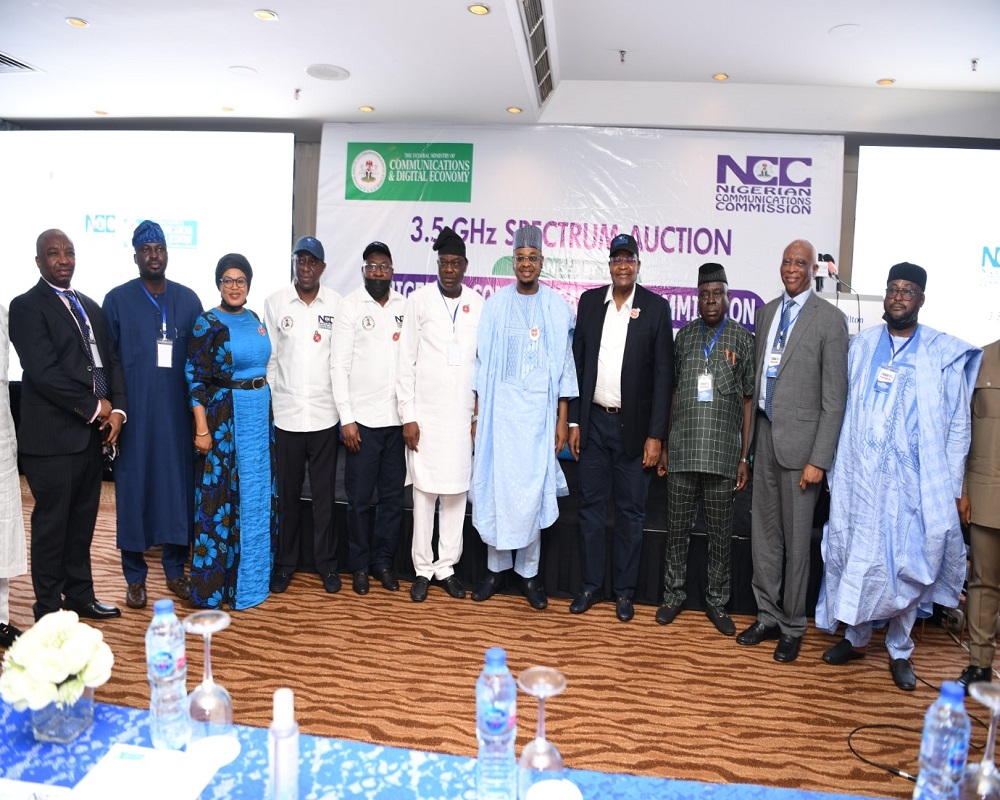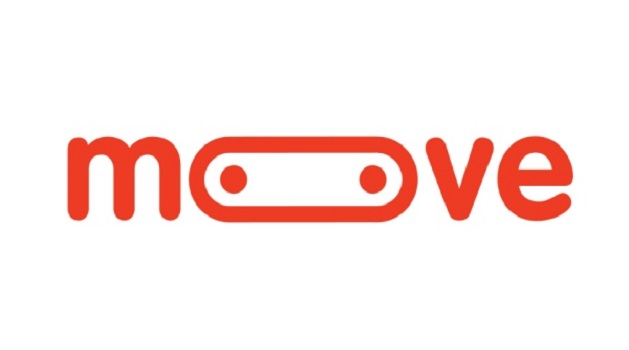General News
5G: Mafab, MTN Emerge Winners in Nigeria’s 3.5GHz Spectrum Auction

After 11 rounds of bidding that lasted eight hours, Mafab Communications Ltd and MTN Nigeria Plc, have emerged the two successful winners of the 3.5 gigahertz (GHz) spectrum auction for the deployment of Fifth Generation (5G) technology to support the delivery of ubiquitous broadband services in Nigeria.

L-R: Dr. Abimbola Alale, Managing Director, Nigerian Communications Satellite; Adeleke Adewolu, Executive Commissioner, Stakeholder Management, NCC; Ubale Maska, Executive Commissioner, Technical Services, NCC; Prof. Adeolu Akande, Chairman, Board of Commissioners, NCC; Dr. Isa Ali Pantami, Honourable Minister of Communications and Digital Economy; Prof. Umar Garba Danbatta, Executive Vice Chairman, NCC; Prof. Millionaire Abowei, Commissioner, NCC; Clement Baiye, Commissioner, NCC; Prof. Mohammed Ajiya, President, Digital Bridge Institute
The two winners emerged in a keenly contested 3.5GHz Spectrum auction conducted by the Nigerian Communications Commission (NCC), in collaboration with the Federal Ministry of Communications and Digital Economy.
The event took place at the Transcorp Hilton Hotel, Abuja on Monday, December 13, 2021.
The commission in a statement signed by Dr. Ikechukwu Adinde, Director, Public Affairs, noted that three companies, namely MTN, Airtel and Mafab Communications Limited, had qualified for the auction, having met the requirements stipulated in the Information Memorandum (IM) for the spectrum auction.
“The three companies had also participated in a mock auction held on Friday, December 10, 2021, which served as a precursor to the Main Auction conducted on today (Monday, December 13, 2021).
“In an exercise that clearly demonstrated demand outstripping supply, with Ascending Clock Auction System adopted by the Commission, the three bidders participated in the intensely competitive auction bid.
“In the first Round of the auction, the bid price was fixed at $199,374,000.00; $201,367,740.00 at second Round; $204,388,356.10 at third Round; $209,407,962.50 at fourth Round and $215,782,901.30 at the fifth Round.
“The auction prices increased progressively to $224,414,217.43 at the Sixth Round; $231,146,643.96 at the seventh Round; $240, 392,509.71 at the eighth Round; $251, 210,172.65 at the ninth Round; and $263,700,050.00 at the Round 10 of the auction exercise.
“The auction process reached its peak at Round 11 when the bid price graduated to $275,904,886.25 with all the three bidders still actively participating.
“The Main Stage of the Auction, however, ended at the conclusion of the 11th Round, with Airtel listing an exit bid of $270,000,000, while MTN posted an exit bid of $273,000,000, giving way to the Assignment Stage.
“At this point, Airtel had dropped off from the race having posted a lower exit bid, thus leaving Mafab and MTN as winners of the two available lots”.
Announcing the results of the Auction exercise, Prof. Umar Garba Danbatta, Executive Vice Chairman of NCC and Auction Overseer, who recalled the processes and activities leading to the successful conduct of the auction, said the NCC published a public notice on its decision to award two lots of 100 megahertz (MHz) Time Division Duplex (TDD) available in the 3.5 GHz band through an auction process to support the delivery of ubiquitous broadband services for the deployment of 5G network in Nigeria.
“Subsequently, an Information Memorandum was issued on November 10, 2021, in which Bid applications for the available spectrum lots were invited.
“By the deadline for receipt of applications on November 29, 2021, the Commission received applications from three licensed telecoms companies, viz: Airtel Networks Limited, Mafab Communications Limited and MTN Communications Nigeria Limited,” he said.
“The auction held successfully today, Monday December 13, 2021 at the Transcorp Hilton Hotel, Abuja with the three bidders competing for the available two slots.
“The Commission adopted the Ascending Clock Auction format which ended after Round 11 and proceeded to the Assignment Stage. It is my pleasure to announce that at the end of the auction, Mafab Communications Limited and MTN Communications Nigeria Limited emerged as provisional licence winners,” he said.
Arising from the above, Danbatta said that the winning bid price for the auction is $273,600,000 for each lot of 100 MHz TDD and the provisional winners are expected to pay the Winning Bid price, less the Intention-to-Bid Deposit, by February 24, 2022.
He expressed satisfaction that the auction process was efficient, fair, credible, well-organised and transparent and was designed to deliver the ideal outcome.
Accordingly, Danbatta said the strongest bidders have emerged provisional winners, raising a substantial amount for the Federal Government.
The EVC congratulated the winners and thanked the Federal Government for its support and commitment to the deployment of 5G technology in Nigeria, which, he said, will bring substantial network improvements, including higher connection speed, mobility and capacity as well as low-latency capabilities to communications services in Nigeria.
Sequel to the successful auction by the two winners, Danbatta said in line with the processes outlined in the IM, the provisional winners have proceeded to the Assignment Stage.
“MTN Communications Nigeria Plc made an offer of $15,900,000 for the assignment of a preferred Lot, while Mafab Communications Limited made an offer of $11,120,000 for a preferred Lot. Thence, MTN Communications Nigeria Plc, having made the highest offer was given the right to select its most preferred Lot and it selected Lot 1 (3500-3600 MHz), while Lot 2 (3700-3800 MHz) is consequentially assigned to Mafab Communications Limited at no extra cost,” the EVC said.
The EVC thanked all stakeholders, who have contributed to the success of the auction process. He said the huge investment that will accrue from the sales of the spectrum band auctioned will result in increased transformation in life and businesses.
Earlier, at the opening ceremony, the Honourable Minister of Communications and Digital Economy, who doubles as the Chief Host, Prof. Isa Ali Ibrahim (Pantami), who emphasized Federal Government’s commitment to driving digital economy, commended the Commission for its efforts towards implementing the 5G Deployment Plan for the country.
He expressed optimism that the dawn of 5G network in Nigeria will offer significant advantages over current technologies, some of which include much lower latency, higher bandwidth, greater device density, longer battery life for nodes, and greater network flexibility.
Also in his remarks, the Chairman, Board of Commissioners, NCC, Prof. Adeolu Akande, said that spectrum plays a strategic role in meeting the insatiable demand for advanced mobile data services as well as a new wave of wireless broadband such as remote object manipulation, industrial automation, virtual and augmented reality, and next-generation connectivity for vehicles. He said the use cases will continue to increase the impact that mobile services have on societies and economies.
He commended the Minister for his unflinching support, the Board of Commissioners, Management and staff of the NCC for the role they played in making the auction to be successful.
He also thanked the bidders for believing in the Nigerian communications sector by their willingness to invest millions of dollars in the sector for the provision of 5G services.
He said that the Commission is committed to transparency and openness, which the auction represents.
Prof. Akande’s voice was amplified by Engr. Ubale Maska, Executive Commissioner Technical Services at NCC, who served as the auction adviser. While delivering the Vote of Thanks, Maska conveyed the gratitude of the Commission to all stakeholders, giving special mention of the Auction Planning Committee, the media and staff of the Commission.
L-R: Dr. Abimbola Alale, Managing Director, Nigerian Communications Satellite; Adeleke Adewolu, Executive Commissioner, Stakeholder Management, NCC; Ubale Maska, Executive Commissioner, Technical Services, NCC; Prof. Adeolu Akande, Chairman, Board of Commissioners, NCC; Dr. Isa Ali Pantami, Honourable Minister of Communications and Digital Economy; Prof. Umar Garba Danbatta, Executive Vice Chairman, NCC; Prof. Millionaire Abowei, Commissioner, NCC; Clement Baiye, Commissioner, NCC; Prof. Mohammed Ajiya, President, Digital Bridge Institute
General News
Cybervergent Selected as World Economic Forum’s 2025 Technology Pioneer Company

In affirmation of its global standing, Cybervergent, a Pan-African technology company that leverages artificial intelligence to transform how organisations manage risk, governance, privacy, and cybersecurity, has been selected as one of the World Economic Forum’s (WEF) Technology Pioneers for 2025—a global cohort spotlighting companies transforming industries through breakthrough technologies and responsible innovation.

The WEF, an international organisation committed to improving the state of the world through public-private collaboration, brings together global leaders to shape economic, technological, and societal agendas. Cybervergent now joins this global community.
The company is recognized for its innovative approach to building digital trust, reimagining how organisations manage cybersecurity, risk, privacy and governance.
Commenting on the company’s milestone, Adetokunbo Omotosho, CEO of Cybervergent, said, “I am honoured that Cybervergent has been named a Technology Pioneer by the World Economic Forum. This is more than an accolade — it’s a validation of our commitment to redefining cybersecurity, privacy, and risk management to build true digital trust.
“What makes this recognition even more meaningful is the fact that Cybervergent demonstrates innovation in AI and infrastructure can emerge from any region, challenging conventional perceptions.”
Some past recipients of the Technology Pioneer recognition, including Google, Spotify, and Airbnb have gone on to fundamentally reshape global industries.
As a member of the 2025 Technology Pioneers community, Cybervergent will be contributing to discussions shaping cybersecurity, AI, and cyber resilience across industries and the global digital economy.
General News
Moove Plans to Raise $1.2Bn Debt Round for US Autonomous Vehicle Expansion

Moove, an African mobility fintech startup, is on a quest to secure a $1.2 billion debt financing round to support the rollout of a fleet of autonomous vehicles.

This is in partnership with Alphabet Inc.’s Waymo in the United States, according to a Bloomberg report citing sources familiar with the matter.
The startup has since attracted backing, including from Uber Technologies Inc., and entered a strategic partnership with Waymo in December 2024 to provide financing for self-driving cars.
Ladi Delano, co-founder of Moove, noted that the company has a solid financial track record.
“Moove has built strong relationships with some of the world’s leading lenders. We have also fully repaid our first-ever debt facilities, which signals our maturity and marks a key milestone that demonstrates the strength of our platform as we enter the next phase of global autonomous-vehicle infrastructure deployment,” he said.
The round is reportedly oversubscribed, with strong participation from private credit firms and banks.
Waymo has also not made any official statement regarding the funding round. While final details are expected to be concluded in the coming weeks, the deal will mark a significant milestone for the firm as it ramps up its global ambitions.
Founded in 2020 by Nigerian entrepreneurs, Ladi Delano and Jide Odunsi, Moove began by providing vehicle financing for ride-hailing drivers in Africa’s largest cities.
General News
Firm Explores the Evolution of AI-powered Ransomware with Password-gated Capabilities

Kaspersky experts have revealed the inner workings of FunkSec — a ransomware group that illustrates the future of mass cybercrime: AI-powered, multifunctional, highly adaptive and operating on volume with ransoms as low as $10,000 to maximise profits.

Kaspersky’s Global Research and Analysis Team (GReAT) constantly monitors the ransomware threat landscape, where attacks continue to rise. According to the company’s latest State of Ransomware report, the share of users affected by ransomware attacks worldwide increased to 0.44% from 2023 to 2024, up by 0.02 percentage points.
While this percentage may appear modest compared to other cyber threats, it reflects the fact that attackers typically prioritise high-value targets rather than mass distribution, making each incident potentially devastating. Within this evolving landscape, FunkSec has emerged as a particularly concerning threat.
Active for less than a year since its emergence in late 2024, FunkSec has quickly surpassed many established actors by targeting government, technology, finance and education sectors. What sets FunkSec apart is its sophisticated technical architecture and AI-assisted development.
The group packages full-scale encryption and aggressive data exfiltration into a single Rust-based executable, capable of disabling over 50 processes on victim machines and equipped with self-cleanup features to evade defenses.
Beyond its core ransomware functionality, FunkSec has expanded its toolkit to include a password generator and a basic DDoS tool — both showing clear signs of code synthesis using large language models (LLMs).
FunkSec’s approach reflects the evolving landscape of mass cybercrime, combining advanced tools and tactics. Kaspersky’s GReAT experts highlight the key features that define their operations:
Password-Controlled functionality
GReAT experts discovered that FunkSec ransomware features a unique password-based mechanism that controls its operation modes. Without a password, the malware performs basic file encryption, while providing a password activates a more aggressive data exfiltration process in addition to encryption to steal sensitive data.
FunkSec packs full-scale encryption, local exfiltration and self-cleanup into a single Rust binary—without a side-loader or a companion script. That level of consolidation is uncommon and gives affiliates a plug-and-play tool they can deploy almost anywhere.
Use of AI in development
Code analysis shows that FunkSec is actively using generative artificial intelligence to create its tools. Many parts of the code seem to be automatically generated rather than manually written. Signs of this generic placeholder comments (such as “placeholder for actual check”) and technical inconsistencies, like commands for different operating systems that don’t align properly. Additionally, the presence of declared but unused functions—such as modules included upfront but never utilised — reflects how large language models combine multiple code snippets without pruning redundant elements.
“More and more, we see cybercriminals leveraging AI to develop malicious tools. Generative AI lowers barriers and accelerates malware creation, enabling cybercriminals to adapt their tactics faster.
By reducing the entry threshold, AI allows even less experienced attackers to quickly develop sophisticated malware at scale,” comments Marc Rivero, Lead Security Researcher at Kaspersky’s GReAT.
High-volume, low-ransom strategy
FunkSec demands unusually low ransom payments, sometimes as little as $10,000, and pairs this with the sale of stolen data at discounted prices to third parties. This strategy appears designed to enable a high volume of attacks, helping the group quickly establish its reputation within the cybercriminal underground. Unlike traditional ransomware groups that seek million-dollar ransoms, FunkSec employs a high-frequency, low-cost model — further underscoring its use of AI to streamline and scale operations.
Expands beyond ransomware
FunkSec has expanded its capabilities beyond the ransomware binary. Its dark leak site (DLS) hosts additional tools, including a Python-based password generator designed to support brute-force and password-spraying attacks, as well as a basic DDoS tool.
Advanced evasion
FunkSec employs advanced evasion techniques to avoid detection and complicate forensic analysis. The ransomware is capable of stopping over 50 processes and services to ensure thorough encryption of targeted files. Additionally, it includes a fallback mechanism to execute certain commands even if the user launching FunkSec lacks sufficient privileges.

 Telecom2 days ago
Telecom2 days agoMTN Nigeria Debuts Game-Changing CPaaS Platform at NextNow Forum

 News2 days ago
News2 days agoAMCON Confirms ₦100Bn Sale of Ibadan DisCo Amid Legal Disputes

 E-Financial1 day ago
E-Financial1 day agoCourt Affirms NIBSS Authority to Manage BVN

 E-Financial2 days ago
E-Financial2 days agoNAICOM Issues New Licenses to SanlamAllianz Life, General Insurance

 E-Business2 days ago
E-Business2 days agoDomain of Deception as Attackers Deploy Spyware Under Guise of Legal Threats

 E-Financial2 days ago
E-Financial2 days agoGTCO to Become First Nigerian Bank to List on London Stock Exchange

 Telecom1 day ago
Telecom1 day agoMTN, 9mobile Commence Ground-breaking National Infrastructure Partnership

 Broadcasting2 days ago
Broadcasting2 days agoIFC, AfDB Collaborate with EbonyLife Media to Explore Supporting the African Film Industry to Drive Job Creation
























